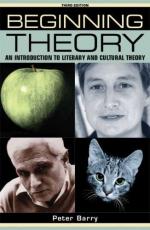
|
| Name: _________________________ | Period: ___________________ |
This quiz consists of 5 multiple choice and 5 short answer questions through Theory before theory - liberal humanism.
Multiple Choice Questions
1. The Introduction states that ________, like novelists, are dauntingly plentiful.
(a) Romanticists.
(b) Theorists.
(c) Journalists.
(d) Poets.
2. Who does the narrator say was the founder of a method of studying English which is still the norm today?
(a) Samuel Langhorne Clemens.
(b) I.A. Richards.
(c) Ralph Waldo Emerson.
(d) T.S. Eliot.
3. Who was appointed Professor at King's College, London in 1840?
(a) J.R.R. Tolkien.
(b) Nick Hornby.
(c) F.D. Maurice.
(d) Frank McCourt.
4. In Percy Bysshe Shelley's ________(1821) saw poetry as essentially engaged in what a group of twentieth-century Russian critics later called "defamiliarization."
(a) The Necessity of Atheism.
(b) Cenci.
(c) Queen Mab.
(d) A Defence of Poetry.
5. According to the narrator in the Introduction, the term "liberal humanism" became current in what decade?
(a) 1910s.
(b) 1970s.
(c) 1920s.
(d) 1930s.
Short Answer Questions
1. According to the narrator in the Introduction, what two introductions to theory sources deal with the problems of teaching or learning theory?
2. What does Peter Barry say was the earliest work of theory written by Aristotle?
3. ________ was founded on the notion of close reading, according to the narrator.
4. What does Peter Barry say is the topic of the book Beginning Theory?
5. What language does the narrator describe as being a Romance language that takes most of its words directly from Latin, and lacks the reassuring Anglo-Saxon layer of vocabulary?
|
This section contains 259 words (approx. 1 page at 300 words per page) |

|




